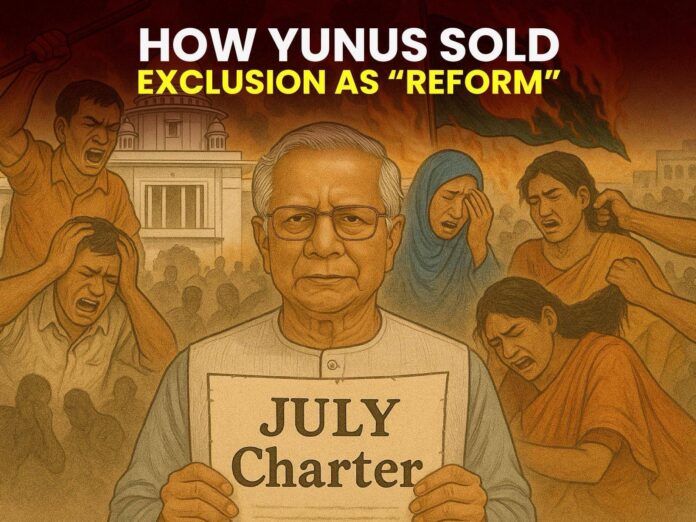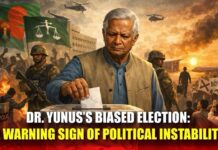The so-called July Charter was proclaimed a national reform program — but in truth, it was a carefully staged farce, designed to protect one man. Behind the pompous speeches and diplomatic applause lay a hollow reality. Nearly 60 percent of Bangladesh’s population — the majority who shape the country’s social and political spine — were excluded entirely.
In their place sat a handpicked circle of bureaucrats, foreign consultants, and loyal NGO elites. What Yunus proudly called “national consensus” was, in fact, a closed-door arrangement crafted to please foreign observers and shield his own position.
This was no reform. It was a spectacle — democracy without the people. By excluding the vast majority, Yunus turned the July Charter into a shield for self-preservation. What should have been born through a national dialogue became an instrument of deception. The July Charter was never meant to rebuild democracy; it was meant to rewrite the story of one man’s escape.
A Charter of Exclusion
The signing of the July Charter was a gathering without a nation. Most major political parties refused to attend — a deliberate act of protest exposing its hollow legitimacy. Even the long-standing “King’s Party,” the NCP, stayed away. When the true centers of power and representation are absent, any claim of legitimacy becomes nothing but an orchestrated lie.
This was never a “charter of reform.” It was a charter of exclusion. Yunus and his inner circle chose a carefully curated cast of elites, academics, and NGO figures — selected not for vision, but for obedience.
These hand-picked voices created the illusion of national unity, while deliberately silencing the majority. Those who form the backbone of Bangladesh’s democracy — the laborers, the farmers, the political workers — were entirely erased from the scene.
It was not dialogue. It was theater.
The July Charter did not bring reform; it institutionalized exclusion. Its true purpose was transparent — to protect Yunus, to project authority, and to sell the world a fabricated image of change. The nation itself was missing. This so-called “reform” was nothing more than a staged deception.
A Plan for Survival
The July Charter was never about Bangladesh; it was about Muhammad Yunus. Cornered by growing criticism and investigations at home, Yunus used the Charter as a smokescreen — a way to rewrite his story and escape accountability.
Every clause, every polished paragraph, every donor-approved endorsement was meticulously crafted for one goal: to evade responsibility while performing the illusion of reform. Yunus sold the world a tale of “national revival,” but beneath that shining surface lurked a ruthless truth — behind closed doors, the Charter was nothing more than a survival pact.
By surrounding himself with compliant elites and NGO operatives, Yunus ensured that no independent or dissenting mind could challenge him. Opposing voices were silenced, dissent erased, and the majority of Bangladesh’s citizens deliberately ignored.
This was not leadership.
It was a masterclass in manipulation.
Through the July Charter, Yunus secured his safe passage — posing as a reformer while systematically strangling the voice of his own people. He wielded foreign approval, polished rhetoric, and staged consensus as weapons to conceal his tracks. What was meant to strengthen democracy became the very tool that weakened it.
How Yunus Deceived the World
Yunus perhaps always knew — his true audience was never the people of Bangladesh. It was the foreign press, the diplomats, and the donor class. The July Charter was crafted not for citizens, but for Western validation.
It was a calculated performance — a narrative designed to convince the world that he was leading a noble democratic rescue. But the reality inside Bangladesh told a far darker story.
Through selective briefings and curated leaks, Yunus sold a manufactured version of the nation — one where he was the reformer, the savior, the enlightened guide. The Charter was dressed up as an inclusive document, though most political voices were deliberately shut out. The international media showed the spectacle — but never asked who was left unseen.
Yunus exploited the distance between global perception and local reality. He spoke their language, praised their ideals, and packaged his story for their headlines. What the world saw was a picturesque tableau — designed for the camera, not for the people.
Yet behind the diplomatic smiles lay a merciless truth:
The July Charter was never built to fix democracy. It was built to protect Yunus’s image.
He told the West a story of moral leadership, even as he silenced those he claimed to represent. Yunus did not merely deceive the world — he weaponized it against his own country.
The Illusion of Reform
By silencing the majority, fabricating legitimacy, and deceiving the world, Yunus and his circle delivered the July Charter. So when the next national election or so-called unity process takes place under the same hands — what outcome can one expect? The answer is grim.
Those who destroyed credibility in the name of reform can never build democracy. Those who turned exclusion into policy will reconstruct that same exclusion into the nation’s future.
The July Charter revealed the true mindset of the elite — that democracy can be staged, representation can be faked, and power can be traded behind closed doors. Under this same leadership, the coming national election will likely yield the same actors, the same script, the same ending — a silent people, and a world applauding a beautifully arranged illusion.
Under Yunus’s leadership, “national unity” is a contradiction.
No nation can be united if its people are silenced.
No democracy can be rebuilt by bypassing its citizens.
And legitimacy can never be restored through deception and control.





